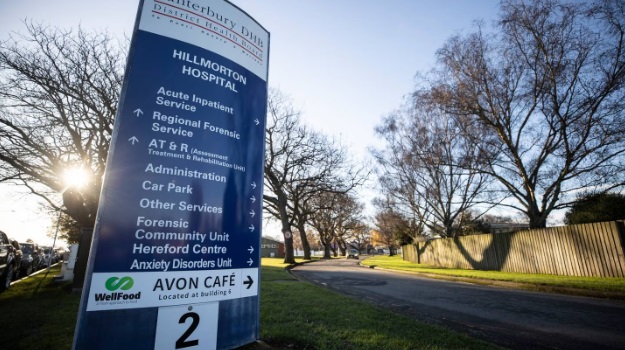
In response to the emails, obtained by The New Zealand Herald under the Official Information Act, Te Whatu Ora Waitaha acknowledged the pressures their specialist mental health and addiction services were experiencing, including consultant psychiatrists, and said workforce shortages were a “large part of this”.
However, they say the service has seen a “significant improvement” recently across almost all professions.
Te Whatu Ora Waitaha released a series of emails to the Herald under the Official Information Act relating to concerns about staffing shortages.
On July 31, a staff member working in the Forensic Community Team (FCT) at Hillmorton Hospital emailed several people, including Forensic Mental Health Nursing director Patsy Tarrant.
In the email, the staff member asked what input the FCT would be receiving that week to cover “dire and unsafe staffing shortages and how patient care will be managed”.
Due to one staff member being away sick and another on training, that left the staff member and one other for case manager coverage.
“While I am aware staff cannot be plucked from nowhere, I am concerned that there seems to be a watch-and-wait approach with regards to managing our staffing shortage.”
The staff member said “I personally, will not be extending myself beyond my current caseload - in the interests of trying to safely and appropriately manage the caseload I already have (which remains difficult).
“There is currently no scope for safe patient care in the instance of any staff sickness, given we are trying to operate as though we have a full staffing quota when we are far from that luxury.”
The staffer suggested that, effective immediately, the FCT adopt “emergency measures” similar to what was done during the Covid-19 lockdown, for patient care.
In response, Tarrant told the staffer they were in “very challenging times”, but assured it was not a watch-and-wait situation.
She said the senior leadership team had been working to come up with “contingency plans.
“The situation at FCT has been escalated,” the email said.
The staff member responded by saying some remedies that had been put in place still had around about half of the case manager full-time equivalents they required to function.
“I am concerned that we continue to provide service that would be expected/reflective of a full staffing contingent, thus putting us in the position of delivering care that is at best negligent, and at worst unsafe and compromising.”
On August 9 a psychiatrist emailed the acting clinical director of Forensic Mental Health Services Jane Hughes and the chief of psychiatry Sigi Schmidt.
“I am extremely concerned about the current level of psychiatrist staffing in the Canterbury Regional Forensic Service,” the staffer said.
The staff member said by their calculations Senior Medical Officer staffing was at about half the funded full-time equivalent allocation.
“This staffing crisis will become worse during periods of planned leave from September 2023 onwards.”

“I cannot see these issues being resolved in the short term. There has been two recent departures of experienced SMO staff and further staff appear likely to follow,” the email said.
“The current situation requires an immediate high-level organisational response. I also strongly recommend briefing the Ministry of Health about the situation, if this has not already taken place.”
Schmidt replied the following day to say he shared the staffer’s concerns, particularly in relation to their suggestion that further staff were likely to leave.
“We take the wellbeing and retention of all staff including SMOs very seriously and I agree that an organisational response is required.”
Schmidt said the issue with reduced medical staffing had already been escalated, and he’d had discussions with the Director of Mental Health and Addictions Dr John Crawshaw about the SMO departures and concerns regarding the sustainability of the forensic service, including concerns about the viability of the forensic advanced training programme in Christchurch.
In her response, Hughes suggested an in-person meeting would facilitate a “more in-depth discussion.
“I understand the pressure the service is under and I appreciate your commitment to the forensic service…”
On August 17 the psychiatrist emailed again asking for an “urgent update” on what contingency planning about SMO staffing in the forensic service had occurred to date and requested an “urgent meeting” to discuss issues.
Hughes said she did not have a further update, but said the concerns they had raised were “too important to discuss by email”, and asked to meet in person.
Te Whatu Ora Waitaha’s specialist mental health service general manager Vicki Dent told the Herald she acknowledged the pressures the specialist mental health and addiction services were re-experiencing.
She said the staffing within Canterbury’s Forensic Mental Health Service had seen a “significant improvement” recently across almost all professions.
“However we currently have vacancies for psychiatrists and one of our accredited supervisors for our advanced forensic psychiatry training programme has resigned.
“We are actively recruiting for more forensic psychiatrists and we have plans in place to make sure our current advanced forensic psychiatry trainee has adequate supervision. We are also working with our colleagues across the country to consider our next steps for our training programme.”
Dent added it was important to recognise that the change of the scale required to address the mental health and addiction system would “take time to implement and establish.
“However, Te Whatu Ora is committed to improving and transforming the system to ensure that anyone who needs support gets it, regardless of age or location, with timely access to care. Our staff go above and beyond to provide care to our community and I thank them for all of their hard work.”
By Sam Sherwood













